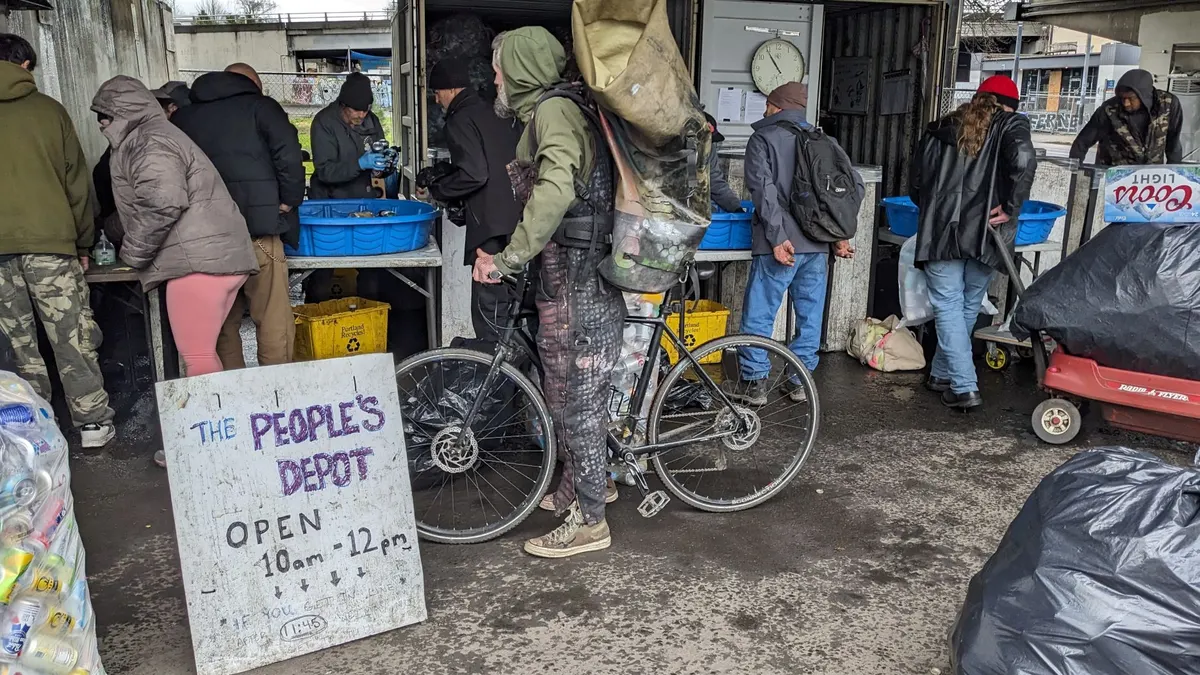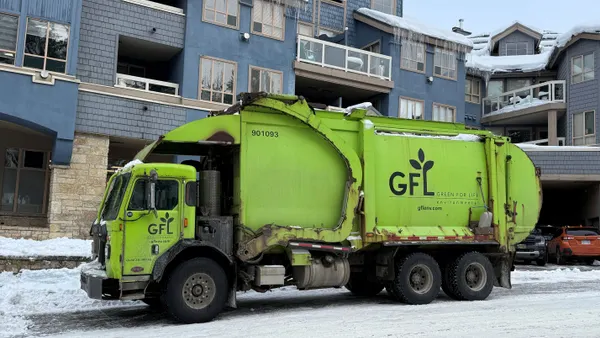Dive Brief:
- The People’s Depot, a container redemption and job training center in Portland, Oregon, is planning to move to a permanent building after a few years operating in an open-air space under a bridge.
- The move is partly the result of a new Oregon law taking effect next month that allows the establishment of a new kind of “alternative” redemption center in certain areas of the state. That includes sites meant for canners, or people who collect cans and bottles as a source of income.
- The People’s Depot is a redemption center designed specifically for canners, as well as people experiencing homelessness and other underserved populations. The depot has outgrown its current location and expects to double its capacity in the new space and hire several more employees.
Dive Insight:
Oregon typically has the highest redemption rate of any bottle bill state and offers residents a range of redemption options, according to the Container Recycling Institute.
Yet the program was also a source of tension in parts of Portland earlier this year. Some retailers and residents said certain downtown redemption centers attracted drug activity and encampments for people experiencing homelessness, affecting other citizens’ access to the program. Some retail take-back operators said the environment deterred residents from returning containers, while some homeless advocates said the situation vilified people who primarily make an income from collecting containers.
The new law enables certain nonprofits to open “alternative access” redemption centers, which are not operated at a traditional retailer like a grocer or convenience store. Effective Oct. 1, certain traditional redemption centers can scale back their collection services or reduce the hours they accept container returns, as long as they are close enough to one of these new alternative collection sites.
The law also formalizes and stabilizes funding for The People’s Depot by establishing a convenience zone in the region around the facility. That means certain large retailers located inside the zone, like grocery stores, pay to partially fund the depot’s work, said operational manager Kris Brown. The People’s Depot is currently funded by grants from the Oregon Beverage Recycling Cooperative, the distributor-run organization that manages the state’s container return system.
The People’s Depot has needed to expand for some time, said Taylor Cass Talbott, co-director of Ground Score Association, a nonprofit that manages the depot and provides job training and other services.
The depot processed about 9.5 million containers in 2024 and is on track to process at least 10 million this year. The depot routinely runs out of space to store containers and sometimes has to close early when it runs out of cash, Talbott said.
“We have completely maxed out that site, and we're breaking records every day,” she said.
The proposed new location, about a mile away from the original, would double capacity while vastly improving working conditions, Brown said. The current space has no running water or electricity, and employees work limited hours because the depot site is only allowed to operate for about two hours a day.
In the proposed new space, opening hours will double, and “all my employees will get another 12 to 15 hours of work a week, which almost doubles their paycheck and will help them a lot,” Brown said.
Depot workers sort containers by hand, which Cass Talbott said is necessary to provide low-barrier jobs. Some canners experience barriers to formal employment due to not having an ID or stable housing, or they experience health issues, according to Ground Score.
The new facility will add equipment meant to speed up certain processes without replacing workers, Cass Talbott said. The People’s Depot plans to install StreamCount technology, an AI-enabled system developed by OBRC to rapidly count containers as they move along a conveyor belt. OBRC said this technology is used in some of the state’s busiest redemption centers to more quickly move customers through the facility and more promptly disburse cash.
The People’s Depot hopes to move at the end of December or in January, Brown said, but there are still numerous steps before they can do so. That includes filing an application with the Oregon Liquor and Cannabis Commission, which is a standard local process, and undergoing a 30-day public comment period.
The depot is already facing opposition from some nearby residents, Brown said. “Some think that if we move into the neighborhood, we're going to be bringing drug dealers and drug addicts with us, and it's really been an uphill battle to fight the bias,” he said.
Yet Brown said the workers and customers who come to The People’s Depot “just want to contribute to the system, and this facility will allow us to magnify that. These people are good people doing the best that they can.”
OBRC has been a major supporter of the depot and has increased its funding for it each of the last few years, Brown added. That support shows The People’s Depot is a legitimate part of the state’s redemption system, he said.
“Instead of it being top-down, they showed they support a bottom-up organization that allows people to work with bottles and cans as gainful employment,” he said.
This story first appeared in the Waste Dive: Recycling newsletter. Sign up for the weekly emails here.














